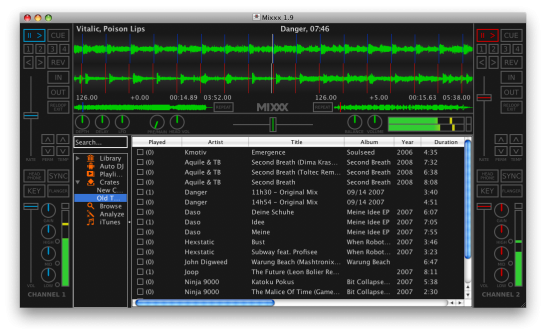The Mixxx development team has released Mixxx 1.9.0, an update to the free, open source DJ application that adds several major new features, including Shoutcast support, direct deck outputs for external mixers, and ReplayGain normalization.
Other open source applications may be cool, but can you rock the house with Linux? Can you get the party started with Apache?
We think not.
Details on Mixxx 1.9 below.
New in Mixxx 1.9:
- Shoutcast / Icecast support
- Mixxx can now broadcast over the internet (heavily requested feature)
- External Mixer Support
- The new Sound Hardware preferences pane allows you to route each playback deck separately, which allows you to use Mixxx with an external mixer.
- ReplayGain normalization
- A user from our forum worked closely with our developers to fully implement volume normalization, including performing the ReplayGain analysis for tracks which are not tagged.
- Waveform Gain
- The scrolling waveforms now scale according to the channel gain for better visual feedback.
- Key lock buttons
- Formerly known as “pitch-independent time stretch”, there are now easily accessible key-lock buttons for each for deck.
- Revamped default skin
- Since the original source material for the Outline Netbook skin was lost eons ago, our artist completely redid it from scratch and tweaked it for better visibility. The new skin has also added EQ kill switches.
- HSS1394 support (Windows, OS X)
- Mixxx now supports firewire HSS1394 MIDI devices such as the Stanton SCS.1 series.
- Improved FLAC support
- We’re now using libFLAC directly for smoother FLAC decoding.
- Revamped metadata parsing
- Integration of TagLib allows Mixxx to parse more metadata from songs, and do it more consistently.
- Metadata writing
- Mixxx can now write changes in song metadata back to disk. This feature is off by default, and can be enabled in the Library preferences pane.
- Millisecond time display
- The time counters in Mixxx now have an extra millisecond display.
- Library improvements:
- Played column – The library now indicates whether a song has been played in the current session already, and also counts the total number of times the song has been played.
- Ratings column – 5 stars, no stars, or anywhere in between.
- Better search – Search now searches in more columns, and by-term instead of by-phrase.
- Revamped iTunes integration – A rewrite yielded a significant speedup of iTunes parsing.
- Faster library scanning – The library scanner should perform much better on large libraries.
- Inline Editing – Double click any item in the track table to edit its contents.
- Recording to MP3/Ogg – Now your recordings can be saved in either MP3 or Ogg/Vorbis format.
- New MIDI mappings:
- Vestax Typhoon
- Vestax Spin
- Hercules DJ Console Mk4
- Numark MIXTRACK
- Pioneer CDJ-350
- Updated MIDI mappings:
- Hercules DJ Control MP3
- Hercules DJ Control e2
- Hercules DJ Control Steel
- Hercules MK2
- Vestax VCI-100
- Reloop Digital Jockey 2
- M-Audio Xponent
- Tons of bug fixes and performance improvements!


nope. sorry. the coolest open source application today is chrome, followed closely by Ardour. Mixxx can be #3 🙂
"Other open source applications may be cool, but can you rock the house with Linux? Can you get the party started with Apache?"
Apparently the author is unaware that mixxx is a native linux app that gets ported to osx/windows second. I run mixxx on linux with a RT kernel on a netbook and it has lower latency than most commercial DVS do on a mac book pro. So yes, you can rock the house with linux, and mixxx at the same time. Still, can't complain about people plugging mixxx =)
well mixxx is a good candidate to "rock the house" and I must admit… not many others may say the same… yet.
I think the Synthopia author meant, "can you rock the house with [the Linux kernel]?".
🙂
No slight intended against Linux, Apache, Chrome or Ardour.
But the fact that Mixxx runs on Linux, OS X & Windows means that the rocking of houses should properly be attributed to you and your Mixxx-mastery.